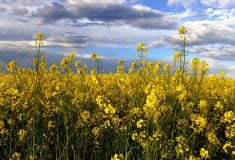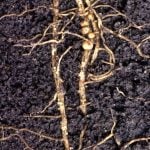A Montreal chemical company has signed a deal with Cargill to develop a new microorganism that produces a multi-use industrial chemical from plant cellulose such as straw, corn stover and wood waste.
The deal, announced Wednesday, gives BioAmber Inc. exclusive rights to Cargill’s technology for making succinic acid from lignocellulose, the carbohydrate-rich materials in plant cell walls.
Typically made using non-renewable sources such as butane, succinic acid is used in dyes, perfumes, lacquers and plasticizers, and in the food and beverage industries as a flavouring agent.
Read Also

Sigurdson applauds Alberta farmers
With Alberta’s harvest virtually wrapped up for 2025, provincial Agriculture Minister RJ Sigurdson offered the government’s congratulations to the province’s farmers.
BioAmber uses its own fermentation process with feedstocks such as wheat, which the company said already allows it to make succinic acid at a lower cost and a higher purity than the butane-derived product.
BioAmber in 2010 commissioned a US$27 million plant at Pomacle, France, about 150 km east of Paris, to make succinic acid using glucose milled from wheat. The new plant also produces ethanol and processes sugar beets to make sucrose.
BioAmber, which maintains research labs in Cargill’s hometown of Minneapolis, also contracts its technology to a Chinese firm, Sinoven, to make succinic acid at a plant in Shanghai.
Cargill’s technology, however, “will allow us to dramatically increase the nameplate capacity of existing plants with minimal investment, and further reduce the cost to manufacture our biobased succinic acid,” Jim Millis, BioAmber’s chief technology officer, said in a release.
BioAmber is “actively engaged” in talks to build large-scale succinic acid plants in both North America and Asia, and “we plan to use this new technology in all of our commercial plants when it is ready,” company CEO Jean-Francois Huc said in the release.
“Our technology has been proven in large-scale commercial operations and we think that BioAmber is an ideal partner to commercialize our technology in the field of renewable succinic acid,” Jack Staloch, vice-president and director of Cargill’s Biotechnology Development Center, said in the same release.
“When our technology is ready for commercialization, we anticipate that BioAmber will have plants operating that our technology can be dropped into, generating immediate revenues.”
BioAmber, which is headquartered in Montreal but registered as a U.S. company in Delaware, was set up in 2008 under the name DNP Green Technology, as a spinoff of another chemical firm, Diversified Natural Products.
















